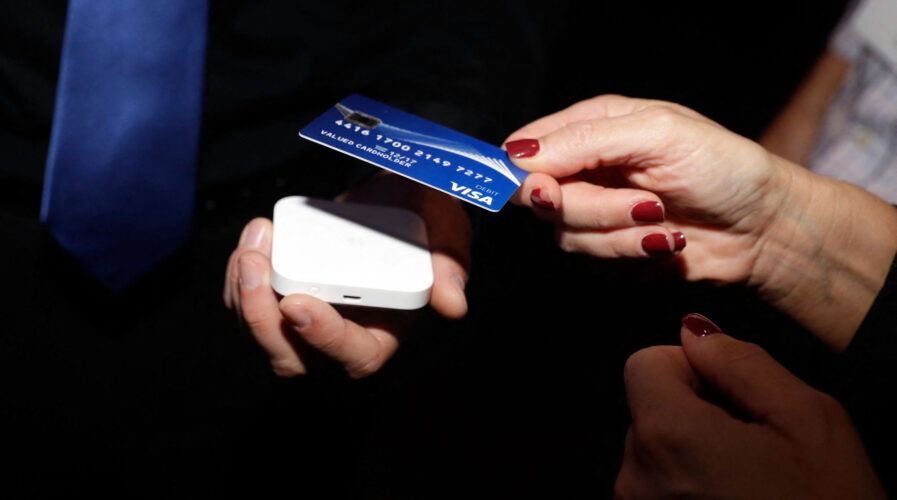
Payment security will be critical in post-pandemic digital commerce. (Photo by Isaac Brekken / GETTY IMAGES NORTH AMERICA / Getty Images via AFP)
Payment security will be critical in post-pandemic digital commerce
- Visa has set its focus on strengthening payment security as consumer behavior evolves during the pandemic
- Visa found that contactless payments are becoming a health and safety priority; on-demand e-commerce experiences have heightened expectations of quality and speed of service; and lines between e-commerce and physical buying have been blurred
In parallel to this pandemic-stricken year in which time often seemed to stand still, global economies moved quickly in ways that accelerated change, bringing lasting impact to consumer behavior, fraud patterns, and risk mitigation needs. For Asia specifically, now more than ever, there is a pressing need for better robust payment security and experiences as consumer behavior evolves beyond the Covid-19 pandemic.
Leading payments giant Visa has set its focus on strengthening payments security as consumer behavior evolves during the pandemic. The group stressed the need for robust payment experiences in a changing commerce environment.
As it is, many businesses are no longer taking cash payments, especially since consumers who were once averse to online shopping have had to change their behavior with the occurrence of the pandemic. As this trend continues, e-commerce is likely to grow across all verticals.
Three trends pervasive in the Asia Pacific
The first noticeable trend is that contactless payments are becoming a health and safety priority; the second, on-demand e-commerce experiences have heightened expectations of quality and speed of service; and finally, the lines between e-commerce and physical purchasing have been blurred.
Because of these trends, Visa noted that fraud has migrated from traditional storefronts to digital commerce. Consequently, it urged the industry to take proactive steps to tackle them. “The pandemic has greatly accelerated changes in consumer behavior, commerce, and hence digital payments. We believe these patterns are here to stay and many first-time digital consumers will decide where to shop based on whether they trust the seller or not,” said Visa Asia Pacific’s regional risk officer Joe Cunningham.
Cunningham emphasized that as digital commerce becomes mainstream, payment security is a fundamental driver of trust so the industry must deliver on consumers’ expectations of safe, convenient, and fast payment experiences.
The payment giant expects contactless payments to replace cash and become the preferred payment method for businesses and consumers, with consumers prioritizing health and safety. As of February 2021, Visa noted that one in two face-to-face Visa transactions in the Asia Pacific is now contactless. Since e-commerce experiences are also shifting, Visa said shoppers now expect products and services to be available when and where they want. This, the company reckons, will require faster, smoother, and more convenient buying and payment experiences.
Additionally, there is an increasing blurring of lines between e-commerce and physical buying. According to Visa data, excluding travel, global e-commerce payment credentials grew over 20% in the last quarter compared to the same period last year, while e-commerce payments volume averaged at least 30% growth in India and Singapore over the last three quarters. This shift is likely to persist as e-commerce growth continues to be robust even as consumers begin to return to stores, Visa said
Security solutions
To stay ahead of the curve, the payments ecosystem must buttress existing infrastructure with enhanced and trusted fraud management solutions, according to Cunningham, since fraudsters evolve their methods faster than consumers and most businesses can prepare for. “In an increasingly digital world, payments security is crucial for consumer trust and must be the foundation of business and commerce, now and in the future,” he said.
Visa has introduced solutions such as Visa Secure to deal with such fraud. It uses the latest standards of the EMV 3-D secure protocol and adds a layer of fraud defense so financial institutions and sellers can be confident that transactions are genuine. This potentially reduces lost sales for sellers because of declined payments and improves the overall consumer shopping experience, Visa claimed.
On the other hand, Visa Token Service (VTS) turns sensitive payment data like card numbers and account details into randomized tokens, thus devaluing data and rendering it useless for fraudsters even if stolen. Visa’s data for the US shows that tokens can reduce fraud by 26% on average compared to online card transactions where consumers enter their card details for making payments, it claimed.
READ MORE
- Ethical AI: The renewed importance of safeguarding data and customer privacy in Generative AI applications
- How Japan balances AI-driven opportunities with cybersecurity needs
- Deploying SASE: Benchmarking your approach
- Insurance everywhere all at once: the digital transformation of the APAC insurance industry
- Google parent Alphabet eyes HubSpot: A potential acquisition shaping the future of CRM


